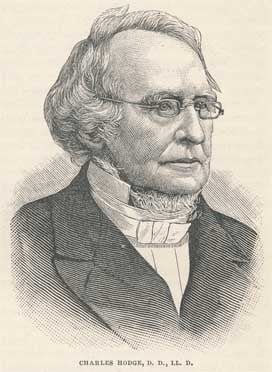A Son of Presbyterians and Patriots —
by Rev. David T. Myers
 There is some dispute as to exactly on what date in December Charles Hodge was born. Several sources, one of them a Presbyterian one, states that he was born on December 28, 1797. Dr. David Calhoun, author of the celebrated book on Princeton Seminary, states that he was born on December 27, 1797. That is the date we will use for this historical devotional.
There is some dispute as to exactly on what date in December Charles Hodge was born. Several sources, one of them a Presbyterian one, states that he was born on December 28, 1797. Dr. David Calhoun, author of the celebrated book on Princeton Seminary, states that he was born on December 27, 1797. That is the date we will use for this historical devotional.
There is no doubt that his ancestors were, as our title puts it, “Presbyterians and Patriots.” His grandfather, Andrew Hodge, had, like so many others, emigrated from Ireland in the decade of 1730’s, settling in Philadelphia, Pennsylvania. When the Great Awakening occurred all over the colonies, the Presbyterian church which he attended, resisted that spiritual work, so the grandfather withdrew from First Presbyterian and helped to organize Second Presbyterian Church in the same city. The new congregation called the Rev. Gilbert Tennent, who was the chief proponent of the New Side Presbyterians.
Charles’s father, Hugh Hodge, a graduate of the College of New Jersey, became a successful surgeon in the city. He married Mary Blanchard of Boston in 1790, who was of French Huguenot stock. Thus, Calvinism was alive and well in his parents. Unhappily, life expectancy was not high in those early years of our country, and with the advent of yellow fever in the city, it was even lower. Three of their children succumbed to the disease, along with their father after Charles was born in 1797. That left the mother with two infants with very little income to rear them.
Mary Hodge, however, made their upbringing her whole life work. Putting boarders in his home for financial aid, she continued to rear her two sons, including Charles, in the things of the Lord. Primary among them was the learning of the Shorter Catechism of the Westminster Standards. Their pastor, now Asabel Green, complemented this home training by teaching out of that historic catechism to the children of the church.
In 1812, after other training, the whole family moved to Princeton, New Jersey. It would be a town which Charles Hodge would forever be identified with in his life and ministry.
Words to live by: This writer cannot stress enough the valued practice of both home and church cooperating together in the memorization of the Westminster Shorter Catechism. It will produce a solid foundation for Christian faith and life in the heart of the young man or woman who learns it, and then applies it to all of life. This writer had that privilege, and has enabled me to stand the challenges of time with it. If you church does not have such a practice, ask the Session of Elders to institute it. It will make the difference in your church testimony and life.
